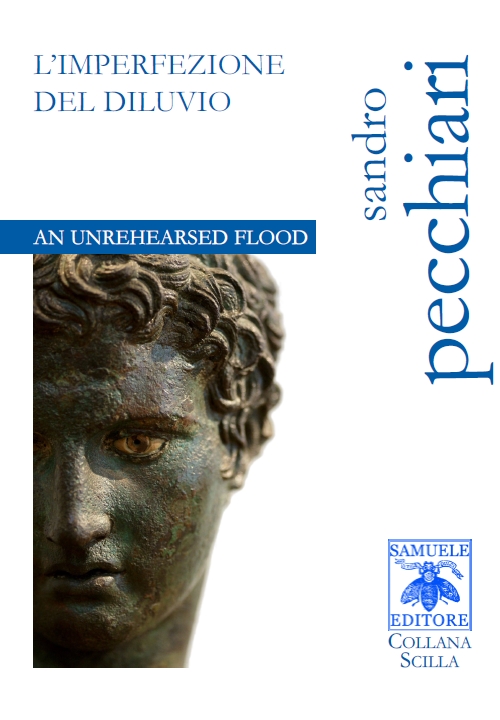
A CENA COL POETA
sabato 30 aprile, ore 20.30
Ristorantino Dry Bridge, Pordenone
Sandro Pecchiari presenta
le sue poesie in italiano e inglese
tratte da
L’imperfezione del diluvio / An Unrehearsed Flood
Samuele Editore 2015
Collana Scilla, prefazione di Andrea Sirotti
Per prenotarsi contattare l’Editore qui
Costo cena 15 euro
If one seeks hope in these poems, one can find it in the straining towards mutability, for a not-better- defined passage of state, of condition: «if time occurs / do not xerox it»; «it’s twining / to twist to bind». As in the wonderful poem IX, in which the allusion to trench warfare – war echoes also show up in other places in this collection, in words like «crouches», «siege», «alarm», and so on – stands as a metaphor for the struggle against overwhelming odds to achieve a redeeming change of state (into healing? Into death?): «you are a sleeping fighter in a trench / the war inside / my sentry-duty / ignores mess and sleep and time // we are waiting to change / this night / you are more nimble than I». The two versions, the Italian and the English, seem to be constructed according to a different poetic equilibrium, products of factors whose result does not change. The author tends to reproduce the same web of sound , but using procedures, specific to the two languages, and with a different distribution within his poetic system. The reader may be struck, for example, by the extraordinary concision of some endings in the English version: «ah, your clear eyes», «game over», «we fell / for want», and above all the splendid «pound my heart», heartrending invocation that recalls Donne’s Holy Sonnets (Batter my heart…). While the Italian version seems to be thoughtful, universalizing, oracular: «che occhi limpidi che hai», «un gioco perso», «si cade / per mancanza», «colpisci forte il cuore». In the very title of the collection, the flood moves from imperfect to «unrehearsed», «not experienced», «acted on without a proper preparation». And by juxtaposing the two elements one gets the idea that the all-too-natural disaster holds within itself the connotations of a fault, of a fleeting senselessness for which the man-actor will never be able to arm himself. Pecchiari, refined scholar and connoisseur of English poetry, seems to be well aware of the potential of the two languages in poetry and almost always avoids a word for word self-translation. Rather, he chooses a kind of faithful rewriting, in which (by placing the two versions “face to face”) nothing gets lost and from which significant modulations in meaning and in expressive strength come to life.
[Andrea Sirotti]
Se in queste liriche vi è una speranza, è nella tensione verso la mutabilità, verso un non meglio definito passaggio di stato, di condizione: «se il tempo accade, non mantenerlo eguale»; «l’essenziale è arrampicarsi / per sforzare i legami». Come nella splendida poesia IX, in cui l’allusione alla guerra di trincea – echi bellici compaiono anche altrove nella silloge, in termini come «s’accampa», «assedio», «allerta», ecc. – si erge a metafora dell’impari battaglia per un salvifico mutare di stato (nella guarigione? Nella morte?): «dormi come un soldato in trincea / la guerra dentro / il mio turno di guardia / ignora rancio e sonno e tempo // attendiamo di mutare / questa notte / tu sei più agile di me). Le due versioni italiana e inglese sembrano costruite su equilibri poetici diversi, prodotti di fattori in cui il risultato non cambia. L’autore tende a riprodurre lo stesso ordito fonico, ma con modalità diverse, caratteristiche delle due lingue, e con una diversa distribuzione all’interno del sistema poesia. Colpiscono, ad esempio, la straordinaria ellitticità di certe chiuse delle poesie inglesi: «ah, your clear eyes», «game over», «we fell / for want», e soprattutto lo splendido «pound my heart», straziante invocazione che ricorda quella del Donne dei sonetti sacri (Batter my heart…). Dove invece l’italiano appare di volta in volta riflessivo, universalizzante, oracolare: «che occhi limpidi che hai», «un gioco perso», «si cade / per mancanza», «colpisci forte il cuore». Nello stesso, efficacissimo, titolo della silloge, il diluvio in questione da imperfetto diventa «unrehearsed», «non provato», «attuato senza preparazione», e dalla giustapposizione dei due elementi si trae l’idea che il disastro, fin troppo naturale, porta in sé le connotazioni di una pecca, di una sfuggente insensatezza verso cui l’uomo-attore non è in grado di attrezzarsi. Pecchiari, raffinato studioso e conoscitore di poesia inglese, appare ben consapevole delle potenzialità delle due lingue in poesia e sfugge quasi sempre, nell’autotradursi, alla resa letterale, per privilegiare una sorta di fedele riscrittura nella quale nulla va perso e da cui scaturiscono (dalla giustapposizione “a fronte” delle due versioni) significative varianti di senso e modulazioni di forza espressiva.
[Andrea Sirotti]
I
Trieste soars upstream
its gusts of air
spare with words
spears steeples
inside the horizon
exiled en route
from childhood
up there along past paths
we desert life
provided we recall
history would be written later
I
Trieste rincorre
scostante di parole
l’aria inerpicata
fiocinando campanili
dentro l’orizzonte
esuli nella rotta
dall’infanzia
lassù nelle vie di ieri
dismettiamo la vita
purché la ricordiamo
la storia l’avremmo scritta dopo
Il libro: qui
Il calendario delle Cene col Poeta: qui
